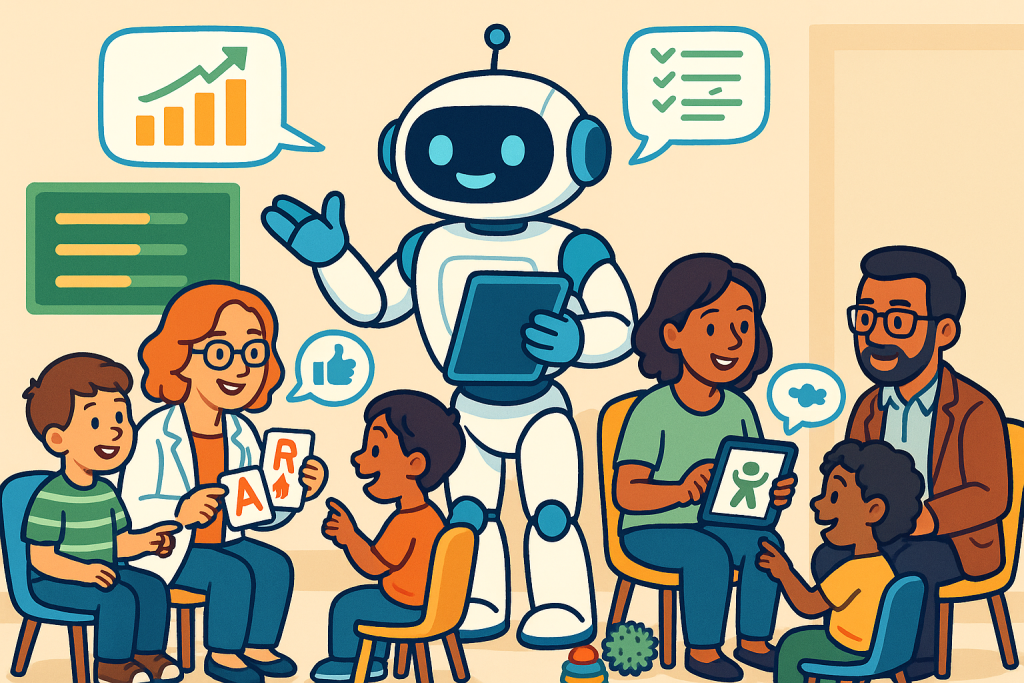
Artificial intelligence (AI) is rapidly changing the world of healthcare—and therapy is no exception. AI agents are increasingly recognized as key tools for supporting professionals in speech therapy, occupational therapy, psychology, psychomotor therapy, and special education. But what exactly are AI agents, and how can you integrate them into your own therapeutic practice for maximum benefit?
What Are AI Agents?
An AI agent is a computer program equipped to make autonomous decisions using advanced algorithms and learning from data. Unlike traditional software, which only follows pre-set instructions, AI agents can observe, interpret, and adapt their responses in real time. In therapy, these agents range from simple chatbots that answer client queries to sophisticated tools capable of analyzing patient data, personalizing interventions, and even assisting with diagnosis and progress monitoring.
Key features of AI agents include:
- Autonomous action (they can make some decisions on their own).
- Ability to learn and improve over time.
- Responsiveness to changing inputs and environments.
- Adaptiveness to individual client needs and preferences.
How AI Agents Are Revolutionizing Therapy
1. Speech Therapists (SLPs)
AI-powered tools are transforming both the efficiency and quality of speech therapy:
- Smart transcriptions: AI can generate documentation with up to 98% accuracy and reduce SOAP note writing time by 90%.
- Real-time feedback: During sessions, AI agents detect pronunciation or fluency errors instantly, offering immediate correction and supporting faster learning.
- Home programs: AI chatbots can guide clients through exercises at home, track progress, and personalize recommendations.
- Accessibility and engagement: Multilingual AI agents bridge language gaps and use gamification to boost participation, especially in pediatric settings.
- Outcome tracking: Objective, ongoing analysis of session data helps tailor programs and document client progress automatically.
2. Occupational Therapists (OTs)
AI solutions help OTs face common challenges: paperwork overload, varied caseloads, and individualized care demands.
- Intelligent documentation: AI-powered note systems reduce time spent on paperwork by up to 90%.
- Predictive analytics: Machine learning analyzes patient data to offer tailored intervention plans and predict which strategies will likely yield the best results.
- Virtual reality integration: Some agents use VR to simulate real-life skills training.
- Goal achievement: Clinics report up to 28% faster therapy progress—thanks to improved personalization and rapid data-driven adjustments.
3. Psychologists and Psychomotor Therapists
AI agents assist psychologists by:
- Automating administration: Scheduling, billing, and notes are handled by AI, freeing more time for direct client work.
- Risk monitoring: AI can flag early signs of relapse, crisis, or distress from conversations, wearable data, or session notes.
- Personalized counseling: Some agents deliver therapy elements (like CBT, EMDR, or relaxation exercises) on demand, or support clinicians with progress insights.
- Collaboration: For psychomotor therapists, AI agents adapt movement-based or sensory-focused interventions to patient needs (though the field is still emerging).
4. Special Educators
Special educators face growing needs for tailored, real-time supports. Agentic AI systems in education:
- Personalize learning experiences: Agents break down goals and optimize activities for each student across cognitive, social, and behavioral domains.
- Generate and align session notes: Instant recommendation generation helps synchronize therapy and classroom interventions.
- Collaborative dashboards: Data-sharing between therapists, teachers, and families supports team-based care with real-time insights.
- Inclusivity: AI agents support various learning abilities, languages, and behavioral challenges, allowing every child’s needs to be addressed flexibly.
How to Benefit from AI Agents in Your Practice
- Start Small: Try an AI agent that automates a single workflow (SOAP notes, progress monitoring, or teletherapy reminders).
- Data-Driven Decisions: Use insights from AI data analytics to refine treatment plans—personalizing care for each client.
- Enhance Access and Engagement: Leverage 24/7 virtual assistants for after-session support or home programs to reinforce in-clinic work.
- Collaborate Across Disciplines: Integrated AI platforms let speech therapists, OTs, psychologists, and educators share data securely, coordinate plans, and unify outcomes for clients.
- Maintain Ethics and Privacy: Always use AI tools that comply with local privacy regulations and choose platforms with strong data protection.
- Continued Education: Attend workshops or webinars on safe, ethical AI integration in therapy and stay up to date as regulations and best practices evolve.
Final Thoughts
AI agents are not here to replace therapists—they enhance what you do best. They offer speed, accuracy, and meaningful support with routine tasks, letting professionals focus on the unpredictable, deeply human elements of care. Whether you are a SLP, OT, psychologist, psychomotor therapist, or special educator, integrating AI agents can help you improve client outcomes, reduce burnout, and make your practice more responsive in a digital, data-driven future. If you want to create and customize your own AI agents to better support your therapeutic practice, check out our comprehensive courses designed specifically for therapists and educators
